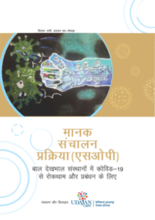childrens_living_arrangement
children_living_without_bio
Displaying 161 - 170 of 427
This guidance from Miracle Foundation outlines case management process and tools aimed at children in Child Care Institutions (CCIs) in India who have been placed with their families during the COVID-19 pandemic. The purpose of these case management processes and tools is to determine feasibility of permanent placement and expedite family-based care in families in which children were placed quickly and without proper preparation during COVID-19 lockdown.
This article from The Hindu describes how the COVID-19 pandemic has impacted new parents in India.
In this opinion piece for the Hindustan Times, Lalita Panicker calls for the inclusion of children’s rights and security as a fundamental pillar in India's response to the COVID-19 pandemic and efforts to reopen the economy, noting that "there are several things the government can do, including strengthening systems to find family members of children orphaned or stranded as a result of the virus."
In this online event, Family for Every Child members FSCE (Ethiopia), The Mulberry Bush (UK), Praajak (India) and CSID (Bangladesh) discussed children's care in the context of COVID-19.
This first How We Care series presents the work of three Family for Every Child Members to help combat child sexual abuse in their regions.
UNICEF India is seeking a consultant to support implementation of the UNICEF programme for alternative care.
"Many orphanages across the district have completely cordoned off their premises, disallowing outsiders from stepping in so as to prevent any potential spreading of COVID-19," says this article from the Hindu, reporting from Madurai, India.
"The sudden imposition of a 21-day lockdown in India to stop the spread of the coronavirus has thrown the lives of millions of children into chaos," says this article from BBC News.
Child abuse hotlines have seen an increase in calls asking for protection from abuse and violence in light of the lockdown put in place to limit the spread of the coronavirus, according to this article from India Times.
This booklet from Udayan Care provides guidance on how to ensure the health, safety, and wellbeing of children in child care institutions in India during the COVID-19 pandemic.


